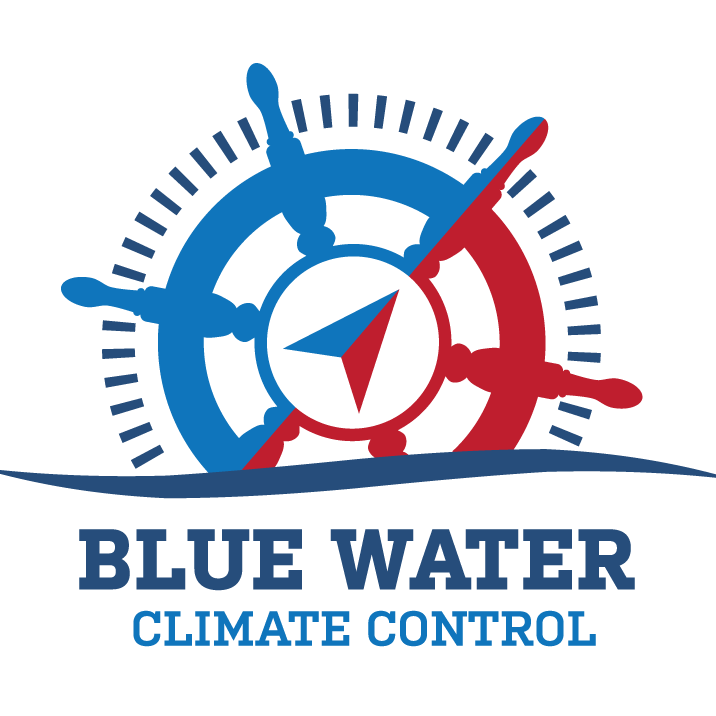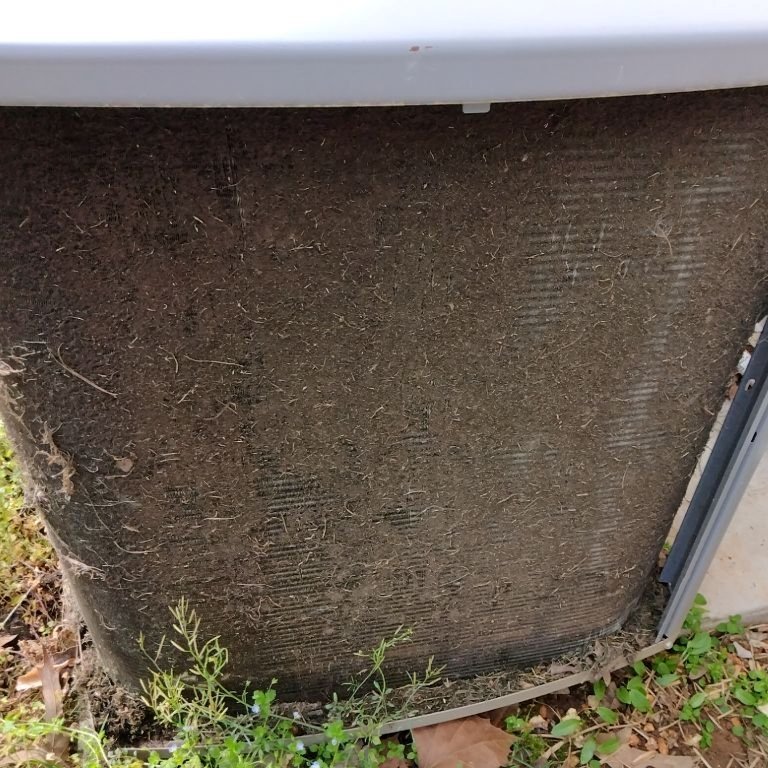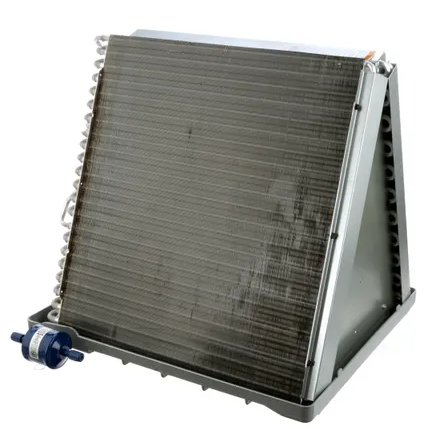Save Money with Air Conditioner Coil Cleaning
Everyone, repeat after me, "Air conditioner coils get dirty!"
Let us tell you why you should have your air conditioner condenser and evaporator coils cleaned.
You need to make sure that you have clean condenser and evaporator coils in your air conditioning system. If your condenser coils are dirty, it can affect the performance of your system, cause premature failure, and cost you more money.
Even if you change your air filter regularly, your indoor coil still requires regular cleaning. Air filters are not 100% efficient. However, because of the air filter, evaporator coil cleaning can usually be less frequent than condenser coil cleaning.
Dirty, fouled condenser coil
When should AC coils be cleaned
Clean AC coils are important during the cooling season and heating season. Clean AC coils promote heat transfer when cold air is needed. This would make one think clean coils are an air conditioning problem. But you want clean air conditioner coils going into the heating season too. Otherwise, the dirt that has accumulated will be baked on by the heat or will flake off and deposit in your ductwork. If you have a heat pump, clean air conditioner coils are just as important during winter as they are during the summer.
What is a coil?
When we use the phrase coil, we are referring to a couple of the most important components of your HVAC system. Your system will have two separate coils, an evaporator and a condenser coil.
Where are your air conditioner coils?
The condenser coil will be what makes up the shape of your outdoor unit and it will be covered by a protective covering. The style of the coil and protective covering can range from brand to brand. Some covers are as simple as a large grid pattern up to slotted panels that make it almost impossible to even see the coil.
The evaporator coil could be inside or outside depending on whether you have a split system or a package unit. If you have a split heat pump, your evaporator coil will likely be in an indoor air-handling unit. If you have a split gas furnace system, the evaporator coil will likely be mounted on top of the furnace.
What do condenser and evaporator coils look like?
Evaporator coil
Air conditioner coils have aluminum fins with copper or aluminum tubes running through them, like a radiator in a car. The refrigerant flows through tubes. The fins increase the heat transfer surface area, air flows through the fins depositing or absorbing heat depending on the coil and operating mode of the system. They also vary in shape. The evaporator coils can be flat sheets very much like your car radiator. They can also be configured for the maximum surface area such as an "A" shape. Condenser coils are typically cylinder or box-shaped.
Coils get dirty
You can't trust your eye.
Your outdoor condenser coils get dirty just from being outside, pollen, dirt, dust, grass clippings, etc. The coil fins have tight internal passages. Even if AC coils look clean, they can be very dirty internally.
Even if you change your filter regularly, your evaporator coils will still gather trace amounts of dirt and grime. If you are waiting to see a visible layer of dirt, you have already caused a lot of damage.
How does it affect my air conditioner
Energy efficiency
The principal problem caused by dirty coils is the effect that it has on heat transfer and energy efficiency. A very thin layer of dirt can have a huge impact on the evaporator coil's ability to remove the heat from your indoor air. Similarly, dirty condenser coils will limit the system's heat transfer capacity. This will cause everything to run hotter. Excessive heat is not good for mechanical or electrical system components. This also causes components to wear out faster.
Shorter life
Another thing to keep in mind is, that high temperature always means higher operating pressures in your refrigeration system. This creates a lot of stress on your compressor. It's similar to running your car in low gear. You are creating a lot of noise and effort trying to get where you are going. Your AC compressor is a very heavy metal component with a large electrical motor. Your compressor will radiate heat throughout the entire unit. If it is hot, everything in that outdoor unit is hot.
Airflow
Dirty AC evaporator coils will restrict the airflow in your system which will cause a whole host of problems. One of the most common issues that accompany low airflow in your indoor evaporator coil is ice buildup. Once it begins to freeze up, it will restrict the air even more and the problem will continue to get worse. This can also be caused by a dirty filter, which is why regular air filter replacements are so important.
Health concerns
Dirty cooling coils can also have an impact on indoor air quality. One of the primary functions of the AC system is that it removes moisture from the air. Dirt and debris on your AC coils will negatively affect the dehumidification process. Additionally, bacteria, dirt, and water are fertile grounds for biological growth. Mildew and mold can quickly spread from your air handler unit to your ductwork and into your home.
How do you clean a coil?
Condenser coils should be cleaned from the inside out.
There are several methods used for air conditioner coil cleaning. HVAC companies base their methods on effectiveness and cost. Some methods can be cost-prohibitive for many customers. Proper tools are very important.
Some of the more common tools used are a spray bottle, garden sprayer, mild detergents, compressed air, brushes, pressure washer, garden hose, shop vac, or steam cleaner. Many commercial cleaners also use a containment method to prevent the spreading of dirt and debris. Regardless of the coil cleaning method, there are precautions to keep in mind.
You can cause damage
The coils have multiple aluminum fins. Bent fins have the same effect on the cooling capacity as dirty fins. The location and accessibility of the indoor unit can complicate AC coil cleaning. You can't use large amounts of water in the air handler enclosure. You could damage ductwork or cause electrical problems. Condenser coils also have delicate fins. Rough, mechanical cleaning or intense pressure washing is ill-advised.
Effective method
The system cabinet access panel for evaporator coils will be small. These are cases when compressed air and steam cleaning may be the most advantageous. We've found steam cleaning to be more practical. Compressed air creates a lot of dust and will be cumbersome to reach many indoor evaporator coils. Steam cleaners are portable and have various attachments that make it easier to clean coils. They are also very handy in cleaning the drain pan.
Be careful with the soap
Using strong detergents during AC coil cleaning is not recommended. Strong detergents can cause indoor air problems. They may also remove protecting coatings used by many air conditioning manufacturers.
Cleaning Evaporator coils on HVAC Systems
An HVAC professional will normally begin cleaning AC coils using a coil fin comb, brush, or vacuum to pull the excess dirt from the evaporator coil. A commercial cleaner may first install a dust enclosure. After that, they may spray a mild detergent on the AC coils to help break up and dislodge all the dirt and grime. Some detergents are rinse-less. But these are more of a routine light cleaning method.
For heavy-duty cleaning, the coil may need to be removed or a method such as steam cleaning may be necessary. Steam cleaning AC coils is a much more effective method. You can reach tight spaces. It doesn't use a lot of water so less mess. The heat of the steam kills microorganisms. It's also easier to reach through the tight access panels on most indoor evaporator coils.
Cleaning Condenser coils on Air Conditioners
Condenser coil cleaning is a part of most regular AC maintenance plans. Because the AC unit is outside, most HVAC companies will simply spray a detergent on the coils and then wash off with a garden hose. If possible the coils should be washed from the inside. This will require pulling the top off the condenser. Some air conditioning unit enclosures may have to be completely removed. This may come with additional charges for the extra labor.
Cleaning the condenser coil should include removing any vegetation that could be affecting airflow through the air conditioner. Vegetation and other components near the HVAC unit create all of the same problems as dirty coils. Avoid building fences or placing other objects within 12 inches of the outdoor cabinet.
How is this going to save you money?
Benefits of regular air conditioner coil cleaning:
Improved heat transfer capacity of your air conditioner. This is going to improve the cooling process and allow the condenser to release heat more efficiently.
The entire system will benefit from operating at normal temperatures. Wear and tear will be reduced.
Airflow will be improved. Airflow is a key component of any effective HVAC system.
Indoor air quality
Improved efficiency. Units run for less time.
Coil cleaning will not only save you money on your monthly electric bill by allowing your unit to run more efficiently, but it will also save you money on future repair bills. Changing your filter regularly to manufacture specifications or more often is an easy way to help your evaporator coil stay clean.
If you're outside watering your garden, filling a pool, or just looking for something to do, grab the garden hose and spray down the coil of your condenser. It may not be as effective as taking the top off and using chemicals, but I can assure you that your condenser will appreciate it.
Final Thoughts
It is vitally important to get regular maintenance and keep your coil clean. Whether it is in the pursuit of saving money or if you are wanting to prolong the life of your unit it is important to maintain your equipment and keep it operating to the best of its abilities.
If it has been a while since you have had your coil cleaned, if you haven’t changed your filter in a while, or if you didn’t even know your system needed a filter, call an AC repair company today and have your coil inspected. Your AC unit will thank you.
AC Repair Series
Capacitors and contractors
Condenser fan motors
Refrigerant
Coil cleaning




